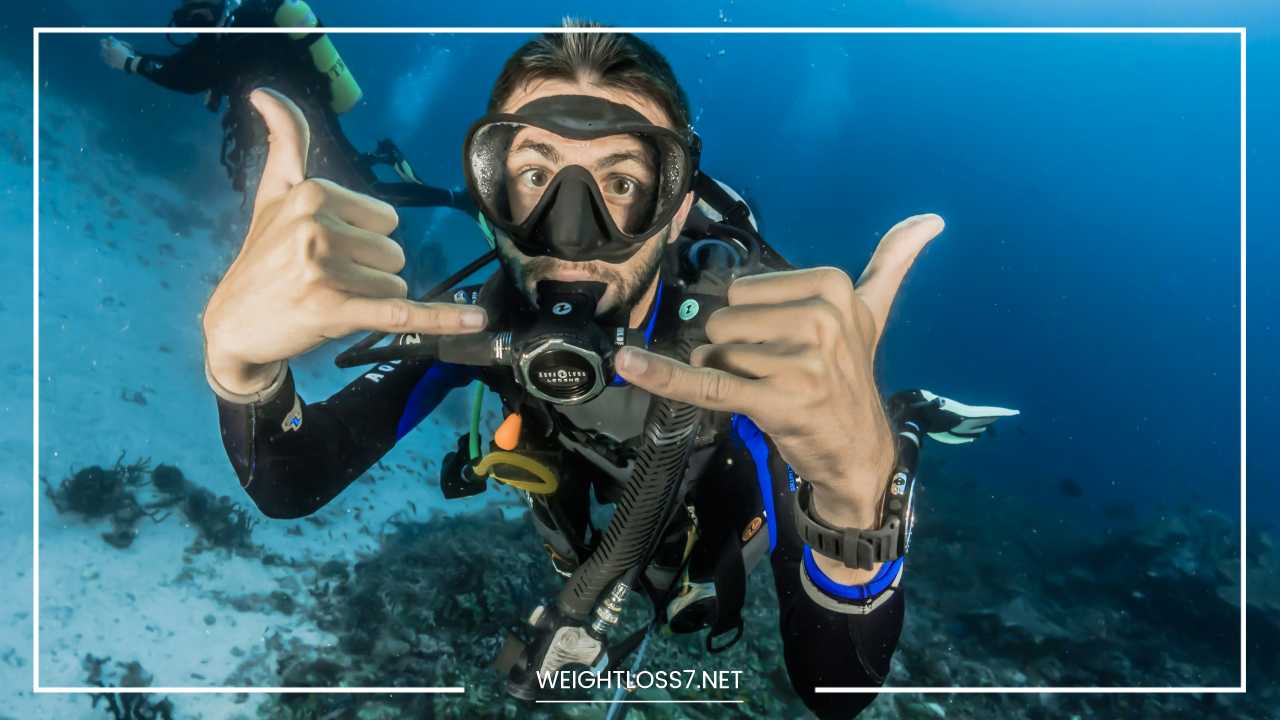Boost Your Wellbeing: Is Scuba Diving Good for You?

Scuba Diving
Boost Your Wellbeing: Is Scuba Diving Good for You? – A Deep Dive into the Benefits
Dreaming of an escape that transcends the ordinary? Yearning for an adventure that revitalizes your body and refreshes your spirit?
Look no further than scuba diving! Often revered for its thrilling underwater explorations, scuba diving offers a surprising wealth of benefits that extend far beyond the awe-inspiring coral reefs.
Let’s embark on a deep dive, exploring how scuba diving can become a powerful tool for boosting your overall well-being on a physical, mental, emotional, and social level.
Physical Fitness: A Full-Body Workout Underwater
Scuba diving is more akin to a full-body workout than a leisurely swim. Imagine this: you’re gently finning through the water, your core engaged for buoyancy control.
Every kick against the gentle resistance of the water strengthens your legs, while maneuvering your gear and maintaining proper body position sculpts your arms and back muscles.
This constant, low-impact exertion translates to a multitude of physical benefits. Studies have shown that regular diving can improve cardiovascular health by increasing lung capacity and reducing resting heart rate.
The buoyant nature of water also eases pressure on your joints, making it a particularly suitable exercise for individuals recovering from injuries or with joint pain. Furthermore, scuba diving can even boost your metabolism, aiding in weight management and overall fitness.
Beyond Fitness: A Gateway to Stress Reduction and Mental Well-being
Imagine a world devoid of deadlines, traffic jams, and the constant buzz of notifications. Scuba diving offers just that – a serene escape from the relentless pull of everyday life.
Descending beneath the surface, you’ll find yourself enveloped by a calming silence punctuated only by the rhythmic sound of your own breathing.
The breathtaking beauty of coral reefs teeming with life, the mesmerizing dance of schools of fish, and the mesmerizing underwater light shows – these sights and experiences have a profound impact on reducing anxiety and promoting a sense of peace and mindfulness.
Research suggests that even a single dive can significantly decrease cortisol levels, the stress hormone, and promote the release of endorphins, the body’s natural feel-good chemicals.
Sharpened Focus and Mindfulness: From Diver to Everyday Ninja
Scuba diving is not just about the destination; it’s about the journey. Every moment underwater requires focused concentration.
Buoyancy control, equipment checks, monitoring depth and air consumption, and navigating underwater terrain with varying currents – all demand a heightened state of awareness.
This sharpened focus translates to improved cognitive function and mindfulness in your everyday life. You’ll find yourself better equipped to handle distractions at work, cultivate a sense of calm amidst the chaos of daily life, and approach challenges with a clear and collected mind.
Confidence and Self-Esteem: Mastering the Deep and Yourself
Learning to scuba dive is an empowering and transformative journey. Mastering new skills, overcoming initial anxieties about breathing underwater, and exploring the wonders of the ocean all contribute to a healthy sense of accomplishment and self-confidence.
The challenges you overcome during training and dives – conquering buoyancy issues, navigating currents, or mastering emergency procedures – translate into a newfound belief in your abilities.
This newfound confidence spills over into other aspects of your life, empowering you to take on challenges both big and small with a newfound sense of self-assurance.
Social Connection and Community: Finding Your Tribe Among the Reefs
Scuba diving is rarely a solitary pursuit. The buddy system, a cornerstone of safe diving practices, fosters strong bonds between divers.
Exploring the underwater world with like-minded individuals creates a unique sense of camaraderie. You’ll find yourself joining dive clubs, participating in group trips with fellow enthusiasts, and forging lifelong friendships based on a shared passion for the ocean and its wonders.
Research suggests that strong social connections are crucial for happiness and well-being. The diving community provides a sense of belonging, fostering supportive relationships that extend far beyond the water’s surface.
Environmental Awareness and Conservation: Champions of the Ocean
Scuba diving allows you to witness the ocean’s beauty firsthand. The vibrant coral reefs teeming with life, the playful dolphins gracefully gliding through the water, the intricate dance of marine life – these experiences foster a deep appreciation for the natural world and its delicate balance.
Divers are more likely to become advocates for ocean conservation, supporting initiatives that protect these fragile ecosystems.
They become stewards of the underwater world, participating in clean-up efforts and spreading awareness about the importance of marine conservation.
A Lifelong Adventure: Unveiling the Mysteries of the Ocean
Unlike many hobbies that tend to have a learning curve and plateau, scuba diving offers endless opportunities for exploration and growth.
From local reefs accessible from shore to exotic coral atolls teeming with biodiversity, the underwater world holds a lifetime’s worth of adventures.
Whether you’re honing your technical diving skills to explore shipwrecks and deep reefs, or simply seeking new dive sites teeming with unique marine life, scuba diving ensures a constant source of excitement and keeps your spirit young.
The thrill of discovery, the challenge of mastering new diving techniques, and the awe-inspiring beauty of unexplored underwater realms all contribute to a sense of lifelong adventure.
Beyond the Physical: The Emotional Connection with the Ocean
Scuba diving fosters a unique emotional connection with the ocean. Being surrounded by the vastness of the underwater world instills a sense of awe and wonder.
The weightlessness experienced during dives can be incredibly liberating, promoting feelings of peace and tranquility.
Observing the intricate dance of marine life and the delicate balance of the underwater ecosystem cultivates a sense of respect and responsibility towards the environment.
Scuba diving can even be a form of therapy, offering a sense of escape from daily anxieties and promoting emotional well-being.
Unplug and Recharge: A Digital Detox in the Deep Blue
In our increasingly digital world, the constant barrage of information and notifications can be overwhelming. Scuba diving offers a welcome escape from this digital overload.
Descending beneath the surface, you’ll find yourself disconnected from the constant buzz of your phone and the pressures of social media.
This digital detox allows your mind to truly relax and recharge, fostering a sense of peace and clarity. The focus required for safe diving combined with the calming environment promotes mindfulness and a deep connection with the present moment.
Travel and Cultural Exchange: Exploring the World, One Dive at a Time
Scuba diving opens doors to new cultures and breathtaking travel destinations. Many of the world’s most stunning dive sites are located in remote locations with unique cultures and traditions.
By incorporating diving into your travel plans, you’ll gain a deeper appreciation for the diversity of our planet and its people.
You might find yourself exploring ancient Mayan cenotes in Mexico, diving with whale sharks in the Philippines, or encountering playful penguins in the icy waters of Antarctica. Scuba diving becomes a passport to a world of cultural exploration and unforgettable travel experiences.
Embrace the Challenge: Pushing Your Limits and Expanding Your Comfort Zone
Scuba diving presents a unique set of challenges, both physical and mental. Learning to breathe underwater, mastering buoyancy control, and navigating unfamiliar underwater environments all require a certain level of courage and adaptability.
Overcoming these challenges builds resilience and confidence, pushing you outside your comfort zone and fostering a growth mindset.
The sense of accomplishment after successfully completing a challenging dive or mastering a new skill is incredibly rewarding, leaving you empowered to tackle other challenges in life with a newfound sense of determination.
Important Considerations: Diving Responsibly and Safely
While scuba diving boasts numerous benefits, it’s crucial to approach it responsibly and with safety as the top priority. Here are some key points to remember:
- Get Properly Trained and Certified: Never attempt to dive without the necessary skills and supervision. Enroll in a reputable scuba diving course and obtain the appropriate certification level for your desired diving activities.
- Maintain Good Physical Health: Ensure you’re in good physical condition before diving. Consult a doctor to discuss any pre-existing medical conditions that might pose a risk underwater.
- Respect the Environment: Divers have a responsibility to protect the delicate underwater ecosystem. Be a mindful diver, avoid touching coral, and dispose of waste properly. Support sustainable diving practices and advocate for ocean conservation initiatives.
Ready to Take the Plunge?
If you’re looking for an activity that invigorates your body, soothes your mind, connects you with nature, and fosters a sense of adventure, then scuba diving might be the perfect fit for you.
Take the plunge, explore the wonders of the underwater world, and discover a path to holistic well-being. Remember, with proper training, a sense of adventure, and a commitment to responsible diving practices, scuba diving can become a lifelong journey of exploration, self-discovery, and connection with the magic of the ocean.
Expanding Your Dive Horizons: Specializations and Underwater Adventures
The world of scuba diving extends far beyond the recreational dives on coral reefs. As you gain experience and confidence, you can delve deeper (figuratively and literally) into specialized diving activities, each offering unique challenges and rewards. Here are a few exciting paths you can explore:
-
Technical Diving: For the thrill-seekers, technical diving pushes the boundaries of recreational diving. It involves exploring deeper wrecks, caves, and other advanced underwater environments, requiring specialized equipment, training, and meticulous planning. Technical divers utilize decompression procedures to manage the increased nitrogen narcosis risks at greater depths. This advanced form of diving demands a high level of discipline, focus, and a thirst for exploration.
-
Underwater Photography and Videography: Capture the beauty and magic of the underwater world with the power of photography and videography. This specialization requires honing your skills in camera operation, lighting techniques, and composition while navigating underwater. Whether you’re capturing close-up shots of vibrant nudibranchs or majestic manta rays gliding through the blue, underwater photography allows you to share the wonders of the ocean with others and document the delicate ecosystems you explore.
-
Underwater Archaeology: History buffs can delve into the past by becoming an underwater archaeologist. This fascinating specialization involves exploring submerged shipwrecks, ancient ruins, and other historical artifacts underwater. It requires training in archaeological methods, underwater search techniques, and proper documentation procedures. Imagine uncovering a lost civilization or a long-forgotten shipwreck – underwater archaeology offers a unique blend of exploration, history, and scientific discovery.
-
Marine Biology Diving: For those with a passion for the ocean’s inhabitants, marine biology diving allows you to study marine life in its natural habitat. This specialization involves learning about different underwater species, their behaviors, and the ecosystems they inhabit. Marine biology divers might participate in coral reef surveys, fish population monitoring, or even contribute to scientific research projects.
-
Freediving: Experience the freedom of movement and the serenity of the underwater world with freediving. This form of diving involves holding your breath and exploring the depths on a single breath. Freediving requires specialized training techniques to manage oxygen depletion and maximize breath-hold time. It fosters a deep connection with the underwater environment and allows you to observe marine life from a completely different perspective.
Beyond Diving: Contributing to Ocean Conservation
Scuba diving doesn’t have to end underwater. Divers can become powerful advocates for ocean conservation. Here’s how you can make a difference:
-
Support Sustainable Diving Practices: Choose responsible dive operators who prioritize environmental protection and minimize their impact on the underwater world.
-
Participate in Coral Reef Restoration Efforts: Many organizations work on restoring coral reefs damaged by pollution and climate change. Divers can join these initiatives and help rebuild these vital ecosystems.
-
Become a Citizen Scientist: Contribute to scientific research by participating in citizen science programs that collect data on marine life populations or monitor water quality.
-
Spread Awareness: Educate others about the importance of ocean conservation and the threats faced by marine ecosystems. Share your experiences and inspire others to protect the underwater world.
Scuba diving is more than just a recreational activity; it’s a gateway to a world of exploration, self-discovery, and connection with nature.
By embracing the challenges, diving responsibly, and contributing to ocean conservation, you can become a steward of the underwater world and ensure its beauty thrives for generations to come. So, are you ready to take the plunge and embark on your own underwater adventure?

















